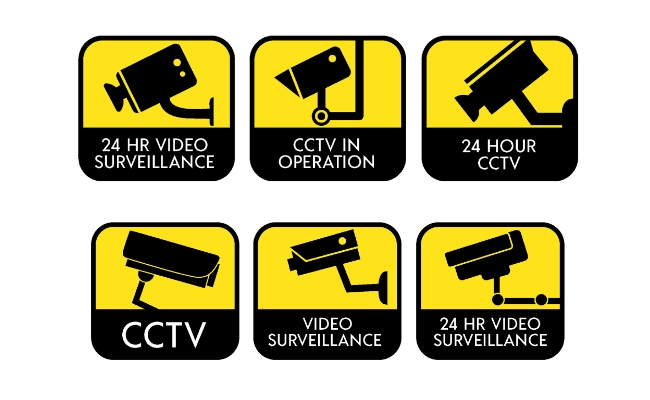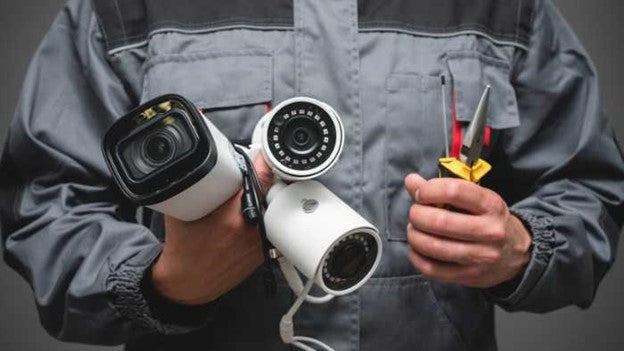Yes, tampering with security cameras is generally illegal. This act can lead to serious legal consequences.
Security cameras serve as critical components in our quest for safety and security. They deter criminal activity, monitor behavior, and provide evidence for legal proceedings. With the rise of digital surveillance, the importance of these devices in both public and private spaces has significantly increased.
Tampering with them not only undermines public safety but also infringes on property rights. Laws across various jurisdictions clearly define and penalize such actions to protect these essential assets. Understanding the legal implications of interfering with security systems is crucial for maintaining the integrity of our security infrastructure. It is important to recognize the role of these devices in ensuring a safer environment for everyone.

Credit: www.safewise.com
The Legality Of Security Camera Tampering
Understanding the laws around security camera tampering is crucial. When someone interferes with these devices, they may face legal consequences. The key is knowing what the law says about different settings and jurisdictions.
Differentiating Between Public And Private Property
Property type matters in legal terms. On public property, security cameras often serve to protect citizens. Tampering with these can lead to serious charges. On private property, owners install cameras for security. Yet, invading someone’s privacy is a concern. So, laws balance protection and privacy rights.
Federal And State Laws On Surveillance Interference
Federal laws protect infrastructure from interference. This includes security cameras. States also have their own laws. These laws can vary widely. Some states focus on the intent behind the tampering. Others look at the consequences of the act.
For instance, federal law may treat tampering as a felony if it endangers public safety. State laws might add penalties if the act disrupts business operations.
| Location | Law Type | Potential Consequence |
|---|---|---|
| Federal | Infrastructure Protection | Felony Charge |
| State | Business Disruption | Additional Penalties |

Credit: reolink.com
Criminal Charges For Camera Tampering
Criminal charges for camera tampering can be severe. Individuals thinking about interfering with security cameras should think again. Legal consequences await those who cross this line.
Vandalism And Criminal Mischief Statutes
Most jurisdictions classify tampering with security cameras as vandalism or criminal mischief. These acts often lead to criminal charges. The law sees security cameras as property. Damaging them is a criminal offense.
- Penalties can include fines, community service, or jail time.
- Charges vary from misdemeanors to felonies, depending on the extent of damage.
- Repeat offenders face harsher consequences.
Privacy Invasion Concerns
Disabling or manipulating cameras can also lead to privacy invasion charges. Individuals may tamper with cameras to hide illegal activities. This act implies intent to invade another’s privacy.
| Charge Type | Possible Penalties |
|---|---|
| Misdemeanor | Fines, short jail term |
| Felony | Higher fines, longer imprisonment |
Victims of such privacy breaches may seek legal action. This could lead to additional civil lawsuits against the perpetrator.
Understanding Consent And Surveillance
Understanding Consent and Surveillance plays a crucial role when dealing with security cameras. Whether it’s a home, public space, or workplace, knowing the legal boundaries is key. Let’s dive into the importance of consent and privacy expectations.
The Role Of Consent In Security Monitoring
Security cameras help keep places safe. Still, recording someone without their permission can be illegal. Owners must inform others about surveillance.
- Signs should be put up to notify of cameras.
- Employees must agree to workplace monitoring.
- Consent is key in private areas.
Expectation Of Privacy In Various Settings
Different places have different privacy rules. People expect more privacy at home than in public. Laws protect these expectations.
| Location | Privacy Level |
|---|---|
| Home | High |
| Work | Medium |
| Public | Low |
Remember, tampering with cameras is usually against the law. Respect privacy and consent.
Real-life Incidents And Legal Precedents
Exploring the realm of security camera tampering unveils a complex interplay between privacy rights and security measures. Real-life incidents and legal precedents shed light on the gravity of such actions. They underscore the legal boundaries around surveillance interference. This section delves into noteworthy case studies and court rulings that highlight the consequences of tampering with security cameras.
Case Studies Of Security Camera Tampering
- Shopping Mall Incident: A person obstructed cameras to shoplift. Caught and charged with theft and tampering.
- Office Dispute: An employee disabled cameras to avoid work surveillance. Faced job termination and legal action for property damage.
- Neighborhood Vandalism: Vandals painted over security cameras in a local park. Arrested and charged with vandalism and public disturbance.
Court Rulings On Surveillance Interference
| Case | Verdict | Penalty |
|---|---|---|
| State vs. Johnson (2018) | Guilty of Tampering | 2 years probation, $500 fine |
| Doe vs. City Surveillance (2019) | Not Guilty | N/A |
| People vs. Smith (2020) | Guilty of Vandalism | 1 year jail, $1000 fine |
These cases emphasize the legal stance against surveillance interference. Each instance of tampering with security cameras not only breaches privacy laws but also poses threats to public safety. Legal systems worldwide continue to evolve, addressing these challenges with stringent penalties and clear legal precedents.
The Impact On Personal Privacy
The topic of tampering with security cameras often sparks debate. One key area of concern is personal privacy. This becomes even more complex when balancing the need for security with individual rights. Let’s explore how this impacts privacy and the ongoing debate surrounding surveillance in public spaces.
Balancing Security Needs With Privacy Rights
Every person values their privacy. Yet, security is also critical. The question then is, how do we find a middle ground? By understanding both sides, we can aim for a solution that respects privacy while ensuring safety.
- Personal spaces should remain private. This means security cameras should not invade these areas without consent.
- Public safety is important. Cameras in public areas help keep people safe.
- Clear laws and guidelines can help balance these needs. They ensure cameras are used responsibly.
The Debate Over Surveillance In Public Spaces
Public surveillance is a hot topic. Some say it’s needed for safety. Others worry about privacy. Let’s look at the key points of this debate.
| Pros of Surveillance | Cons of Surveillance |
|---|---|
| Helps prevent crimes | Can feel like a privacy invasion |
| Aids in catching law-breakers | May be used for wrong reasons |
| Increases public safety | Limits personal freedom |
In summary, finding the right balance is key. Both security and privacy are important. With open dialogue and clear laws, we can protect both.

Credit: montavue.com
Preventive Measures Against Camera Tampering
Security cameras play a crucial role in our safety. Yet, they face threats from tampering. Understanding and implementing preventive measures can help protect these vital assets.
Security Protocols To Deter Tampering
To prevent tampering, robust security protocols are essential. They safeguard cameras against unauthorized access.
- Use tamper-proof hardware: Select cameras with strong, tamper-resistant features.
- Install cameras out of reach: Place cameras high or in hard-to-reach spots.
- Implement alarms: Set up alarms that trigger on tampering attempts.
- Regular checks: Perform routine inspections of the camera setup.
Legal Consequences As A Deterrent
Legal ramifications can serve as a powerful deterrent against tampering. Know the laws to avoid penalties.
| Country | Consequence |
|---|---|
| USA | Fines, imprisonment |
| UK | Heavy fines, jail time |
| Canada | Legal charges, fines |
Understanding these consequences can discourage attempts to tamper with security cameras.
The Role Of Law Enforcement
The Role of Law Enforcement is crucial in upholding the law against security camera tampering. Law enforcement agencies take this matter seriously. They work to protect citizens and property.
Investigative Techniques For Camera Interference
Officers use various methods to investigate tampering. These techniques include:
- Forensic analysis of camera footage.
- Reviewing logs for unauthorized access.
- Interviews with witnesses and suspects.
- Physical inspections of camera setups.
They gather evidence to identify culprits. Their goal is to restore security systems.
Prosecuting Security Camera Tampering Cases
Prosecutors handle these cases with care. They consider the evidence collected. Charges can be severe. They depend on the damage caused.
| Charge Level | Possible Consequences |
|---|---|
| Misdemeanor | Fines, community service, or jail time. |
| Felony | Longer jail terms, higher fines, probation. |
Law enforcement agencies collaborate with legal teams. They ensure justice is served. Their message is clear. Tampering with security cameras is a serious offense. It will not be tolerated.
Navigating The Legal Process
Dealing with legal issues can be daunting. When facing accusations of tampering with security cameras, it’s essential to understand the steps involved in navigating the legal process. This guide will outline the necessary actions and the importance of securing proper legal representation.
Steps To Take If Accused Of Tampering
Immediate action is crucial if you’re accused of tampering with security cameras. Here’s what to do:
- Remain calm and avoid confrontation.
- Do not interfere with the camera or evidence.
- Request to see the accusation in writing.
- Gather any evidence that supports your innocence.
- Write down all details related to the accusation.
- Do not discuss the case with anyone but your lawyer.
Seeking Legal Representation For Tampering Charges
Securing a lawyer is your best defense against tampering charges. Consider these points:
- Choose an attorney experienced in criminal defense.
- Ensure they have a strong track record.
- Discuss all details of the case openly with them.
- Follow their advice closely.
Remember, a robust legal strategy can make a significant difference in the outcome of your case.
Frequently Asked Questions
Can Tampering With Security Cameras Lead To Arrest?
Tampering with security cameras can indeed result in arrest, as it is often considered a criminal act due to privacy and property violations.
What Laws Protect Against Security Camera Tampering?
Different regions have specific laws, but generally, anti-vandalism statutes and privacy protection laws deter security camera tampering.
Are Home Security Cameras Off-limits For Tampering?
Yes, home security cameras are protected under privacy and property rights, making tampering with them illegal without the owner’s consent.
What Penalties Exist For Security Camera Tampering?
Penalties for tampering with security cameras can include fines, imprisonment, or both, depending on the severity and jurisdiction of the offense.
How To Legally Disable A Nuisance Camera?
Legally disabling a nuisance camera typically requires a court order or agreement from the camera’s owner, rather than direct tampering or damage.
Conclusion
Tampering with security cameras is a serious offense, with legal consequences that vary by jurisdiction. Protecting privacy and property rights is essential. Always consult legal experts before taking action on surveillance equipment. Stay informed, stay legal, and respect the boundaries of the law.





